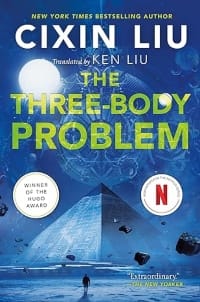
Estimated reading time: 8 minutes
Key Takeaways
- Liu Cixin‘s novel, The Three-Body Problem, explores humanity’s first contact with an alien civilization over a four-hundred-year saga.
- Set during China’s Cultural Revolution, Ye Wenjie invites the technologically advanced Trisolarans to colonize Earth.
- The story examines complex ideas through hard science-fiction, blending human psychology and history.
- The narrative remains engaging while addressing deep questions about human nature and the possibility of alien contact.
- The Three-Body Problem is a compelling introduction to the trilogy, offering a thought-provoking experience in hard sci-fi.
Short Summary
Liu Cixin has quickly risen to the higher echelons of science-fiction prominence after penning the Remembrance of Earth’s Past trilogy, the first book of which is The Three-Body Problem, which has also been made into a television show not long ago. In short, it begins a saga lasting about four hundred years (more or less), detailing humanity’s terrifying first contact, its implications, and the starkly contrasted reality it presents for our civilization as a whole.
Table of contents
Liu Cixin Exposes Humanity to the Universe
The question as to whether or not we’re alone out there has been debated over innumerable times over the past few decades, to say nothing about the rest of human history. Ever since our eyes could lift to the skies, the question had began forming in the backs of our minds. Whichever camp you might be inclined to believe, I think we can all agree that should first contact actually occur, there is little reason to believe it wold be to our advantage. While we might be able to simply daydream about it, the humanity in Liu Cixin‘s The Three-Body Problem has to actually face it.
The story begins innocuously enough, taking us back to China’s Cultural Revolution where we meet Ye Wenjie, a political prisoner first sent to a labour camp, and later recruited to a secret military project attempting to communicate with alien life. The years go by and nothing much comes of it, until a fateful moment shatters life as everyone knows it: a reply to a message is received from an alien planet, caught in the unstable gravitational pull of three stars.
Humanity is rife with seemingly unsolvable problems, some stemming from our inability to cooperate and manage resources adequately, others from the dark nature bound to the very depths of our fallible beings. Yu Wenjie decides to invite the “Trisolarans”, as they come to be referred to, for a good old round of colonization, hoping their unimaginably-advanced technologies and knowledge of the universe could be used for the betterment of the species.
The Trisolarans are more intent on conquering humanity rather than sharing anything with them, but they are faced with a catch: at the rate at which humanity is developing, the four hundred years required for the Trisolaran fleet to reach them will be enough for us to actually technologically eclipse our invaders.
While on their end, the invading force does its best to slow down the progress of our science, on our end, humanity has begun its response to the crisis. However, we are far behind schedule, are limited in what we can achieve, and to make matters worse, a sect has formed to facilitate Earth’s eventual colonization by the aliens. Even though humanity’s darkest days are ahead, there are still those willing to take up the losing fight, to put all their ingenuity and creativity to the service of their civilization, to stop it from being erased back into the nothingness it came from.
The Detailed Chain Reaction in The Three-Body Problem
In my opinion, one of the most difficult feats for an author is to craft a science-fiction story through the lens of hard sci-fi, while touching on topics, ideas and technologies which do not exist today. In essence, the author poses a challenge to themselves to imagine new, non-existent technologies by extrapolating currently-known laws and principles.
In The Three-Body Problem, Liu Cixin applies the lens of hard science-fiction to virtually everything, trying to keep the story as grounded in reality as possible, while dealing with concepts which, for the moment, only exist in our imaginations. And when I say everything, I do quite literally mean that. From the intricacies of an actual three-body solar system to the sociological response given out by humanity as a whole, it’s all examined under a microscope.
In my opinion, the author has shown himself to exceptionally perceptive in regards to human nature, and I think few will find any faults with the various reactions he explores in the book, from steadfast stoicism to welcoming defeatism. Through the attitudes exhibited by people in response to the impending crisis, I think he does an excellent job at exploring the vast spectrum of human intelligence and the ways in which it might answer to such a situation.
While in some cases hard science-fiction books end up feeling a little too sluggish and obtuse, this is far from being the case here. Everything is light, easy to absorb, and perfectly brought down to a layman level we don’t need to strain too hard to comprehend. As a result, we the readers are invited to come up with our own ideas and solutions while keeping the big picture in question.
Another element which really made this whole scientific adventure feel much more relevant and hard-hitting than most novels, is the idea that our species might actually find itself in such a situation one of these days. It may not be today nor tomorrow, but there is a chance we might one day make contact with someone out there, and that someone will see fit to colonize us (at best). How will humanity truly respond to such a scenario?
Outsmarted and Outmaneuvered
Underneath its rigorous scientific exterior and penchant for realism, The Three-Body Problem by Liu Cixin does remain, at its core, a novel, and thankfully the author doesn’t forget that. Once all is said and done, looking back on the book, I don’t think he never implements any element or idea which might hurt the story at the core of the novel.
He understands the need to not only keep the plot progressing, but to also offer us some insights into things more familiar to us, such as our own history. Indeed, the author gives a rather revealing glimpse of a period from modern Chinese history which has flown under most peoples’ radars, truly soaking us in the military paranoia and inhumanely strict observance of the imaginary lines dividing us from each other.
Additionally, the author excels at not only creating high stakes we can all very easily understand and relate to, but also a playing field where our heroes are at a constant disadvantage, at least at the overture to this centuries-long battle of wits. Not only are we technologically-disadvantaged, but we are also at a loss as to how exactly humanity ought to move forward against a threat we can hardly even begin to comprehend.
As is the case for this book and the later ones in the series, Liu Cixin delegates the heroism to unlikely individuals, people capable of thinking so far outside the box, they’ve probably never even seen it in the first place. Watching these people implement unconventional and unorthodox strategies in every sense of those words is nothing short of riveting, constantly keeping us on edge and guessing as to whether or not anything we do might work, despite the tremendous underdogs we might be in this fight.
While it is clear where our loyalties lie as human readers, even though the Trisolarans might be incomprehensible to us, Liu Cixin still attempts to show us their perspective, mainly in regards to motivations. Without really delving into their appearance nor the structure of their society, he does communicate quite well the fascinating challenges faced by a society living in an unstable three-star system, to the point where it becomes difficult to fault them for their ambitions. All sides are equally-justified in this conflict, and all that’s left to do is playing it out.
| PAGES | PUBLISHER | PUB. DATE | ISBN |
|---|---|---|---|
| 416 | Tor Books | Jan. 12 2016 | 978-0765382030 |
The Final Verdict
The Three-Body Problem by Liu Cixin is an astounding work of hard-science fiction, merging the author’s highly-advanced understanding of modern science, his knowledge of history, keen instincts for human behaviour, as well as his storytelling prowess. As a result, we have one of the most engaging sci-fi novels I’ve ever read, perfectly setting the field for the two others which come after.
If you’ve been in search of highly-entertaining and thought-provoking hard sci-fi story revolving around Earth having to cleverly fend off against alien invaders, then you probably won’t find anything better than this trilogy. At least, I personally haven’t.

Cixin Liu
Cixin Liu is a Chinese science-fiction writer who, so far, was awarded the Galaxy Award (China’s most coveted science-fiction award) a grand total of nine times, with the Remembrance of Earth’s Past trilogy being an international bestseller.

